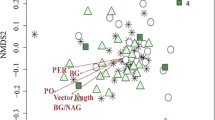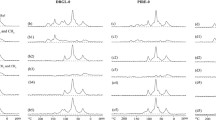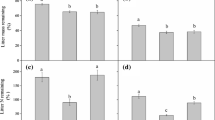Abstract
Background and Aims
Leaf litter decomposition is closely linked to nutrient cycling and driven by environmental conditions, species-specific leaf chemistry, and here in particular by polyphenols composition. However, not much attention has been paid on the decomposition of polyphenols themselves. We hypothesized that phenolics and tannin decomposition rates are species-specific and positively affected by litter species richness.
Methods
Leaf litter of three Chinese tree species was exposed to field decomposition conditions, aggregated in mixtures of different species richness (1-, 2-, 3-species mixtures). We sampled litter five times over the course of 171 days, calculated species-specific total phenolics and total protein precipitable tannin decomposition rates, assessed changes in polyphenol composition using HPLC, and tentatively identified compounds by LC-ESI-MS/MS.
Results
Leaf litter richness effects on phenolics and tannin decomposition rates were positive, except for Sapindus-specific tannins, and differed between leaf litter species. Decomposition duration changed polyphenol compositions, and significantly interacted with leaf litter species richness with increasing effects of litter richness with time.
Conclusions
Litter diversity effects on polyphenol decomposition are crucial for whole leaf litter decomposition. The contrasting dependencies of phenolics and tannin decomposition rates on leaf litter richness may provide explanations for equivocal results in leaf litter mixture experiments.



Similar content being viewed by others
Abbreviations
- LMPs:
-
Low molecular weight phenolics
- HMPs:
-
High molecular weight phenolics
- LC:
-
Liquid chromatography
- HPLC:
-
High-performance liquid chromatography
- LC-MS:
-
Liquid chromatography - mass spectrometry
- ESI:
-
Electro spray ionization
- CID:
-
Collision-induced dissociation
References
Adamczyk B, Karonen M, Adamczyk S et al (2017) Tannins can slow-down but also speed-up soil enzymatic activity in boreal forest. Soil Biol Biochem 107:60–67. doi:10.1016/j.soilbio.2016.12.027
Aerts R (1997) Climate, leaf litter chemistry and leaf litter decomposition in terrestrial ecosystems: a triangular relationship. Oikos 79:439–449. doi:10.2307/3546886
Appel HM (1993) Phenolics in ecological interactions: The importance of oxidation. J Chem Ecol 19:1521–1552. doi:10.1007/BF00984895
Briones MJI, Ineson P (1996) Decomposition of eucalyptus leaves in litter mixtures. Soil Biol Biochem 28:1381–1388. doi:10.1016/S0038-0717(96)00158-7
Bruelheide H, Nadrowski K, Assmann T et al (2014) Designing forest biodiversity experiments: general considerations illustrated by a new large experiment in subtropical China. Methods Ecol Evol 5:74–89. doi:10.1111/2041-210X.12126
Cadisch G, Giller KE (1997) Driven by nature: plant litter quality and decomposition. CAB International, Wallingford
Close DC, McArthur C (2002) Rethinking the role of many plant phenolics–protection from photodamage not herbivores? Oikos 99:166–172. doi:10.1034/j.1600-0706.2002.990117.x
Cornwell WK, Cornelissen JHC, Amatangelo K et al (2008) Plant species traits are the predominant control on litter decomposition rates within biomes worldwide. Ecol Lett 11:1065–1071. doi:10.1111/j.1461-0248.2008.01219.x
Cotrufo MF, Wallenstein MD, Boot CM et al (2013) The Microbial Efficiency-Matrix Stabilization (MEMS) framework integrates plant litter decomposition with soil organic matter stabilization: do labile plant inputs form stable soil organic matter? Glob Chang Biol 19:988–995. doi:10.1111/gcb.12113
Coulis M, Hättenschwiler S, Rapior S, Coq S (2009) The fate of condensed tannins during litter consumption by soil animals. Soil Biol Biochem 41:2573–2578. doi:10.1016/j.soilbio.2009.09.022
Coûteaux M-M, Bottner P, Berg B (1995) Litter decomposition, climate and litter quality. Trends Ecol Evol 10:63–66. doi:10.1016/S0169-5347(00)88978-8
Deschamps AM, Richard C, Lebeault J-M (1983) Bacteriology and nutrition of environmental strains of Klebsiella pneumoniae involved in wood and bark decay. Ann Inst Pasteur Microbiol 134:189–196. doi:10.1016/S0769-2609(83)80080-5
Eichenberg D, Ristok C, Kröber W, Bruelheide H (2014) Plant polyphenols – implications of different sampling, storage and sample processing in biodiversity-ecosystem functioning experiments. Chem Ecol 30:676–692. doi:10.1080/02757540.2014.894987
Eichenberg D, Purschke O, Ristok C et al (2015) Trade-offs between physical and chemical carbon-based leaf defence: of intraspecific variation and trait evolution. J Ecol 103:1667–1679. doi:10.1111/1365-2745.12475
Elzhov TV, Mullen KM, Spiess A-N, Bolker B (2013) minpack.lm: R interface to the Levenberg-Marquardt nonlinear least-squares algorithm found in MINPACK, plus support for bounds. R package version 1.1-8
García-Palacios P, Shaw EA, Wall DH, Hättenschwiler S (2016) Temporal dynamics of biotic and abiotic drivers of litter decomposition. Ecol Lett 19:554–563. doi:10.1111/ele.12590
Gartner TB, Cardon ZG (2004) Decomposition dynamics in mixed-species leaf litter. Oikos 104:230–246. doi:10.1111/j.0030-1299.2004.12738.x
Graham HD (1992) Stabilization of the Prussian blue color in the determination of polyphenols. J Agric Food Chem 40:801–805
Gruber N, Galloway JN (2008) An Earth-system perspective of the global nitrogen cycle. Nature 451:293–296. doi:10.1038/nature06592
Güsewell S (2004) N : P ratios in terrestrial plants: variation and functional significance. New Phytol 164:243–266. doi:10.1111/j.1469-8137.2004.01192.x
Haase K, Wantzen KM (2008) Analysis and decomposition of condensed tannins in tree leaves. Environ Chem Lett 6:71–75. doi:10.1007/s10311-008-0140-7
Hagerman AE (2002) Modified radial diffusion for increased sensitivity. http://www.users.miamioh.edu/hagermae/
Handa IT, Aerts R, Berendse F et al (2014) Consequences of biodiversity loss for litter decomposition across biomes. Nature 509:218–221. doi:10.1038/nature13247
Hättenschwiler S, Vitousek PM (2000) The role of polyphenols in terrestrial ecosystem nutrient cycling. Trends Ecol Evol 15:238–243. doi:10.1016/S0169-5347(00)01861-9
Hättenschwiler S, Tiunov AV, Scheu S (2005) Biodiversity and litter decomposition in terrestrial ecosystems. Annu Rev Ecol Evol Syst 36:191–218. doi:10.1146/annurev.ecolsys.36.112904.151932
Hector A, Beale AJ, Minns A et al (2000) Consequences of the reduction of plant diversity for litter decomposition: effects through litter quality and microenvironment. Oikos 90:357–371. doi:10.1034/j.1600-0706.2000.900217.x
Hernes PJ, Benner R, Cowie GL et al (2001) Tannin diagenesis in mangrove leaves from a tropical estuary: a novel molecular approach. Geochim Cosmochim Acta 65:3109–3122. doi:10.1016/S0016-7037(01)00641-X
Hobbie SE (1996) Temperature and plant species control over litter decomposition in Alaskan tundra. Ecol Monogr 66:503–522. doi:10.2307/2963492
Kainulainen P, Holopainen JK (2002) Concentrations of secondary compounds in Scots pine needles at different stages of decomposition. Soil Biol Biochem 34:37–42. doi:10.1016/S0038-0717(01)00147-X
Kraus TEC, Dahlgren RA, Zasoski RJ (2003) Tannins in nutrient dynamics of forest ecosystems - a review. Plant Soil 256:41–66. doi:10.1023/A:1026206511084
Lin YM, Liu JW, Xiang P et al (2006) Tannin Dynamics of Propagules and Leaves of Kandelia candel and Bruguiera gymnorrhiza in the Jiulong River Estuary, Fujian, China. Biogeochemistry 78:343–359. doi:10.1007/s10533-005-4427-5
Lin YM, Liu JW, Xiang P et al (2007) Tannins and nitrogen dynamics in mangrove leaves at different age and decay stages (Jiulong River Estuary, China). Hydrobiologia 583:285–295. doi:10.1007/s10750-006-0568-3
Lorenz K, Preston CM, Raspe S et al (2000) Litter decomposition and humus characteristics in Canadian and German spruce ecosystems: information from tannin analysis and 13C CPMAS NMR. Soil Biol Biochem 32:779–792. doi:10.1016/S0038-0717(99)00201-1
McTiernan KB, Ineson P, Coward PA (1997) Respiration and nutrient release from tree leaf litter mixtures. Oikos 78:527–538. doi:10.2307/3545614
Meentemeyer V (1978) Macroclimate and lignin control of litter decomposition rates. Ecology 59:465–472. doi:10.2307/1936576
Oksanen J, Blanchet FG, Kindt R et al (2013) Vegan: community ecology package. R package version 2.0–10
Pérez-Harguindeguy N, Blundo CM, Gurvich DE et al (2008) More than the sum of its parts? Assessing litter heterogeneity effects on the decomposition of litter mixtures through leaf chemistry. Plant Soil 303:151–159. doi:10.1007/s11104-007-9495-y
Price ML, Butler LG (1977) Rapid visual estimation and spectrophotometric determination of tannin content of sorghum grain. J Agric Food Chem 25:1268–1273
R Development Core Team (2013) R: a language and environment for statistical computing. R Foundation for Statistical Computing, Vienna
Rashed KN, Ćirić A, Glamočlija J et al (2013) Antimicrobial activity, growth inhibition of human tumour cell lines, and phytochemical characterization of the hydromethanolic extract obtained from Sapindus saponaria L. aerial parts. Biomed Res Int 2013:1–9. doi:10.1155/2013/659183
Rasse DP, Rumpel C, Dignac M-F (2005) Is soil carbon mostly root carbon? Mechanisms for a specific stabilisation. Plant Soil 269:341–356. doi:10.1007/s11104-004-0907-y
Schimel JP, Cates RG, Ruess R (1998) The role of balsam poplar secondary chemicals in controlling soil nutrient dynamics through succession in the Alaskan taiga. Biogeochemistry 42:221–234. doi:10.1023/A:1005911118982
Schmidt MWI, Torn MS, Abiven S et al (2011) Persistence of soil organic matter as an ecosystem property. Nature 478:49–56. doi:10.1038/nature10386
Schofield JA, Hagerman AE, Harold A (1998) Loss of tannins and other phenolics from willow leaf litter. J Chem Ecol 24:1409–1421. doi:10.1023/A:1021287018787
Smolander A, Kanerva S, Adamczyk B, Kitunen V (2012) Nitrogen transformations in boreal forest soils—does composition of plant secondary compounds give any explanations? Plant Soil 350:1–26. doi:10.1007/s11104-011-0895-7
Speed MP, Fenton A, Jones MG et al (2015) Coevolution can explain defensive secondary metabolite diversity in plants. New Phytol. doi:10.1111/nph.13560
Srivastava DS, Cardinale BJ, Downing AL et al (2009) Diversity has stronger top-down than bottom-up effects on decomposition. Ecology 90:1073–1083. doi:10.1890/08-0439.1
Swift MJ, Heal OW, Anderson JM (1979) Decomposition in terrestrial ecosystems. University of California Press, Berkeley
Torti SD, Dearing MD, Kursar TA (1995) Extraction of phenolic compounds from fresh leaves: a comparison of methods. J Chem Ecol 21:117–125. doi:10.1007/BF02036646
Wardle DA, Nilsson M-C, Zackrisson O, Gallet C (2003) Determinants of litter mixing effects in a Swedish boreal forest. Soil Biol Biochem 35:827–835. doi:10.1016/S0038-0717(03)00118-4
Yang X, Bauhus J, Both S et al (2013) Establishment success in a forest biodiversity and ecosystem functioning experiment in subtropical China (BEF-China). Eur J For Res 132:593–606. doi:10.1007/s10342-013-0696-z
Zhang LH, Zhang SJ, Ye GF et al (2013) Changes of tannin and nutrients during decomposition of branchlets of Casuarina equisetifolia plantation in subtropical coastal areas of China. Plant Soil Environ 59:74–79
Acknowledgements
We thank N. Arnold, S. Both, A. Ehrlich, D. Eichenberg, U. Erhard. R. Heinke, M. Hiß, W. H. Müller, Z. Pei, B. Plaga, J. Schmidt, T. Walther and A. Zeuner for practical help. We gratefully acknowledge funding from the German Research Foundation (DFG FOR 891/1 and 2) and the Sino-German Centre for Research Promotion for the participation in a Summer School in Jingdezhen (GZ 1146). We thank the whole BEF-China, and especially the New Integrated Litter Experiment team for the inspiring working atmosphere. Finally, we thank two anonymous reviewers for comments and suggestions to improve the present manuscript.
Author information
Authors and Affiliations
Corresponding author
Ethics declarations
Disclosure of potential conflicts of interest
The authors declare that they have no conflict of interest.
Data Accessibility
Data on phenolics content, tannin content as well as peak area of all 93 quantified peaks are available on the BEF-China Data Portal at http://china.befdata.biow.uni-leipzig.de/datasets/492.
Additional information
Responsible Editor: Peter Christie
Electronic supplementary material
ESM 1
(PDF 279 kb)
Rights and permissions
About this article
Cite this article
Ristok, C., Leppert, K.N., Franke, K. et al. Leaf litter diversity positively affects the decomposition of plant polyphenols. Plant Soil 419, 305–317 (2017). https://doi.org/10.1007/s11104-017-3340-8
Received:
Accepted:
Published:
Issue Date:
DOI: https://doi.org/10.1007/s11104-017-3340-8




